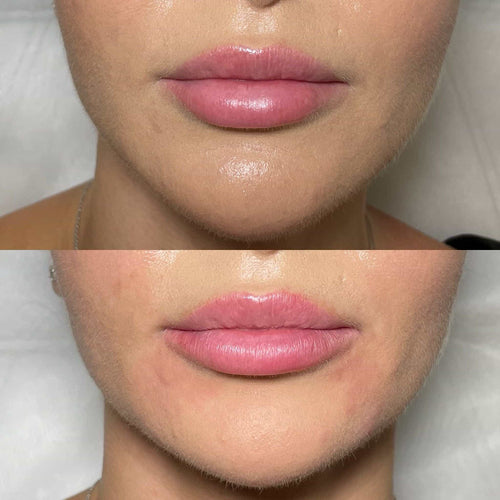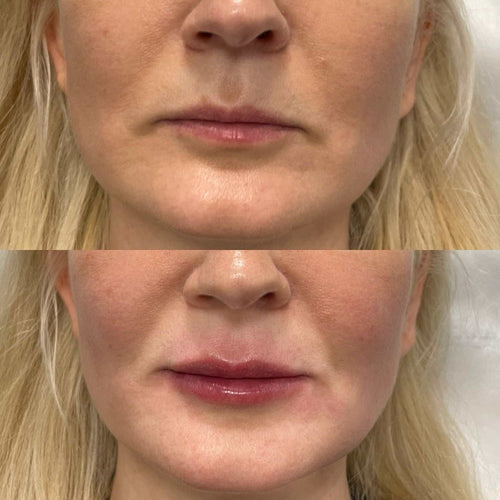Book a Dermal Filler Session with Dr. Laura Geige at It’s Me and You Clinic
Possible Medical Causes
Respiratory Conditions
Feeling short of breath, also known as *dyspnea*, can be a frightening experience. Many factors can contribute to this sensation, ranging from benign causes like anxiety to serious medical conditions affecting the respiratory system.
Here are some possible medical causes for feeling breathless:
Arrange Your Dermal Filler Consultation with Dr. Laura Geige at It’s Me and You Clinic

**Respiratory Conditions:**
-
Asthma: A chronic condition characterized by inflammation and narrowing of the airways, causing wheezing, coughing, and difficulty breathing.
-
Chronic Obstructive Pulmonary Disease (COPD): An umbrella term for conditions like *emphysema* and *chronic bronchitis*, leading to progressive airflow obstruction and shortness of breath.
-
**Pneumonia**: An infection that inflames the air sacs in one or both lungs, causing coughing, fever, chills, and difficulty breathing.
-
Bronchitis: Inflammation of the bronchial tubes, often caused by a viral infection, resulting in cough, mucus production, and shortness of breath.
-
Pulmonary Fibrosis: A scarring of the lung tissue that makes it difficult for the lungs to expand fully, leading to progressive shortness of breath.
**Cardiovascular Conditions:**
-
Heart Failure: The heart’s inability to pump blood efficiently, causing fluid build-up in the lungs and making it harder to breathe.
-
Pulmonary Embolism: A blockage of an artery in the lungs, usually caused by a blood clot, resulting in sudden shortness of breath, chest pain, and coughing up blood.
**Other Causes:**

-
Anxiety or Panic Attacks: Can cause rapid breathing, chest tightness, and feelings of breathlessness.
-
Obesity: Excess weight can put pressure on the diaphragm, making it harder to breathe deeply.
-
High Altitude**: Lower oxygen levels at higher altitudes can lead to shortness of breath.
-
Certain Medications**: Some medications can have side effects that include shortness of breath.
If you are experiencing persistent or worsening shortness of breath, it is crucial to consult a doctor for proper diagnosis and treatment. Early detection and intervention can significantly improve outcomes and quality of life.
Cardiac Issues
Feeling like you’re not getting enough air can be a frightening experience and indicates that something may be wrong with your respiratory system or cardiovascular system.
One possibility is asthma, a chronic condition characterized by inflammation and narrowing of the airways. This makes it difficult to breathe deeply and can trigger shortness of breath.
Another common cause is chronic obstructive pulmonary disease (COPD), which includes conditions like emphysema and chronic bronchitis. COPD damages the lungs over time, making breathing progressively harder.
Lung infections, such as pneumonia or bronchitis, can also lead to shortness of breath due to inflammation and fluid buildup in the lungs.
Anxiety and panic attacks can cause hyperventilation, leading to a feeling of breathlessness even when there’s nothing physically wrong with your lungs.
Pulmonary embolism, a blockage in an artery in the lung, is a serious medical emergency that can cause sudden shortness of breath along with chest pain and coughing up blood.
Certain heart conditions, such as congestive heart failure, can also lead to shortness of breath. When the heart isn’t pumping efficiently, fluid can build up in the lungs, making it difficult to breathe.
Other cardiac issues that may contribute include arrhythmias (irregular heartbeats) and pericarditis (inflammation of the sac surrounding the heart).
If you’re experiencing persistent shortness of breath, it’s crucial to seek medical attention promptly. A doctor can help determine the underlying cause and recommend appropriate treatment.
Other Medical Factors
There are numerous possible medical causes for the sensation of not getting enough air, also known as dyspnea or shortness of breath. These can range from relatively minor and temporary to serious and life-threatening conditions.
**Possible Medical Causes:**
• **Asthma:** A chronic condition characterized by inflammation and narrowing of the airways, leading to wheezing, coughing, and difficulty breathing.
• **Chronic obstructive pulmonary disease (COPD):** A progressive lung disease that includes conditions like emphysema and chronic bronchitis, causing airflow obstruction and shortness of breath.
• **Pneumonia:** An infection that inflames the air sacs in one or both lungs, making it hard to breathe.
• **Pulmonary embolism:** A blockage in an artery in the lungs, often caused by a blood clot, which can lead to sudden and severe shortness of breath.
• **Heart failure:** A condition where the heart cannot pump blood effectively, causing fluid buildup in the lungs and making breathing difficult.
• **Lung cancer:** Can cause coughing, wheezing, and shortness of breath as the tumor grows and presses on the airways.
• **Interstitial lung disease:** A group of disorders that cause scarring and inflammation of the tissue between the air sacs in the lungs, leading to shortness of breath.
• **Sleep apnea:** A condition where breathing repeatedly stops and starts during sleep, resulting in daytime fatigue and shortness of breath.
Other Medical Factors:
• **Anxiety or panic attacks:** Can cause a feeling of tightness in the chest and difficulty breathing due to increased heart rate and muscle tension.
• **Obesity:** Excess weight can put extra strain on the lungs and make it harder to breathe.
• **Dehydration:** Lack of fluids can thicken mucus in the airways, making it difficult to breathe.
• **Altitude sickness:** Occurs when you ascend to high altitudes where there is less oxygen available, leading to shortness of breath.
It’s important to note that this list is not exhaustive and many other medical conditions can cause shortness of breath. If you are experiencing this symptom, it’s essential to consult with a doctor to determine the underlying cause and receive appropriate treatment.
Lifestyle Factors Contributing to Shortness of Breath
Physical Activity Level
Shortness of breath, also known as dyspnea, can be a disconcerting symptom that leaves you feeling like your lungs aren’t providing adequate air. While there are many underlying medical conditions that can cause shortness of breath, lifestyle factors often play a significant role.
Here are some common lifestyle factors that can contribute to feelings of shortness of breath:
* **Lack of Physical Activity:** A sedentary lifestyle weakens your respiratory muscles, making it harder for your lungs to expand and contract efficiently. Regular exercise strengthens these muscles and improves lung capacity.
* **Smoking:** Cigarette smoke irritates and inflames the airways, making it difficult to breathe deeply. Over time, smoking damages the delicate air sacs in your lungs (alveoli), further impairing oxygen absorption.
Schedule a Dermal Filler Appointment with Dr. Laura Geige at It’s Me and You Clinic
* **Obesity:** Excess weight puts additional strain on your respiratory system. Carrying extra pounds can compress your diaphragm, the muscle responsible for breathing, and make it harder to draw in enough air.
* **Air Pollution:** Exposure to pollutants like smog, dust, and fumes can irritate your airways and trigger shortness of breath.
* **Stress and Anxiety:** Stress and anxiety can cause rapid breathing and shallow breaths, leading to a sensation of breathlessness.
* **Poor Posture:** Slouching or hunching over can restrict the expansion of your chest cavity, making it harder to take full breaths.
Regular physical activity is crucial for maintaining healthy respiratory function. Aim for at least 30 minutes of moderate-intensity exercise most days of the week.
If you are experiencing persistent shortness of breath, it’s essential to consult with a healthcare professional to rule out any underlying medical conditions and discuss appropriate treatment options.
Altitude and Environmental Factors
Shortness of breath, or dyspnea, can be a disconcerting symptom that significantly impacts quality of life. It’s characterized by a feeling of not being able to get enough air into the lungs, often accompanied by an uncomfortable tightness in the chest.
While medical conditions are common culprits behind shortness of breath, several lifestyle factors, altitude, and environmental conditions can also contribute to this sensation.
**Lifestyle Factors:**
* **Smoking:** Tobacco smoke damages the delicate tissues lining the airways, reducing lung capacity and efficiency. It leads to chronic obstructive pulmonary disease (COPD), a leading cause of shortness of breath.
*Obesity: Excess weight puts additional strain on the respiratory system, making it harder for the lungs to expand fully during inhalation.
* **Physical Inactivity: A sedentary lifestyle weakens the respiratory muscles, reducing lung capacity and overall fitness. Regular exercise strengthens these muscles and improves breathing efficiency.
*Poor Posture: Slouching or hunching over can compress the chest cavity, restricting lung expansion. Maintaining good posture allows for optimal airflow.
* **Alcohol and Drug Use:** Excessive alcohol consumption and certain drugs can irritate the respiratory tract, causing inflammation and making breathing difficult.
Altitude:**
As altitude increases, air pressure decreases, resulting in lower oxygen levels. The body adapts to this by increasing heart rate and respiration rate, but some individuals may experience shortness of breath, known as acute mountain sickness.
This can occur even at relatively low altitudes for people unaccustomed to thinner air.
Environmental Factors:
* **Air Pollution:** Exposure to pollutants like smog, dust, and fumes can irritate the airways and trigger shortness of breath, especially in individuals with pre-existing respiratory conditions.
*
**Allergens:** Pollen, mold spores, and pet dander can trigger allergic reactions that cause airway inflammation and constriction, leading to difficulty breathing.
It’s important to note that experiencing shortness of breath occasionally might not be cause for alarm. However, if it becomes frequent or severe, especially when accompanied by other symptoms such as chest pain, wheezing, coughing, or fatigue, seeking medical attention is crucial.
Stress and Anxiety
Shortness of breath can be a distressing symptom, and it often goes hand-in-hand with feelings of stress and anxiety. While underlying medical conditions are a common cause, several lifestyle factors can also significantly contribute to these sensations.
One major factor is **poor posture**. Slouching or hunching over compresses the chest cavity, restricting lung capacity and making it harder to take deep breaths. This can trigger feelings of breathlessness and tightness in the chest.
**Smoking** is another significant contributor. Cigarette smoke damages the delicate air sacs in the lungs, reducing their ability to transfer oxygen into the bloodstream. It also irritates airways, causing inflammation and narrowing, further hindering airflow.
**Sedentary behavior** can weaken respiratory muscles, making it more difficult to breathe deeply. A lack of regular physical activity reduces lung capacity and overall fitness, leaving you feeling short of breath even with minimal exertion.
**Diet** plays a role as well. Processed foods high in sugar and unhealthy fats can lead to inflammation throughout the body, including in the lungs. A balanced diet rich in fruits, vegetables, and whole grains supports lung health and overall well-being.
**Dehydration** is another important consideration. When the body lacks sufficient fluids, mucus production increases, making it harder to clear airways and breathe comfortably.
**Environmental factors**, like air pollution, allergens, and dust mites, can also trigger shortness of breath and worsen existing respiratory conditions.
Stress and anxiety themselves can exacerbate these symptoms. When under stress, the body enters “fight-or-flight” mode, accelerating heart rate and breathing, which can lead to a feeling of breathlessness. Additionally, anxiety often manifests as chest tightness and rapid breathing, further contributing to the sensation of shortness of breath.
It’s crucial to note that if you experience persistent or severe shortness of breath, consult a healthcare professional to rule out any underlying medical conditions.
When to Seek Medical Attention
Persistent or Worsening Symptoms
Feeling like you aren’t getting enough air, also known as shortness of breath, can be a concerning symptom. While sometimes caused by minor issues like anxiety or exertion, it can also indicate more serious underlying medical conditions.
It’s important to distinguish between occasional shortness of breath that resolves on its own and persistent or worsening shortness of breath that interferes with your daily life.
Here are some situations where seeking immediate medical attention is crucial:
- Sudden onset of severe shortness of breath
- Shortness of breath accompanied by chest pain or pressure
- Blueish discoloration of lips, fingernails, or skin (cyanosis)
- Difficulty speaking or wheezing
- Confusion or dizziness
- Fainting
These symptoms can indicate a life-threatening emergency, such as a heart attack, pulmonary embolism, or asthma attack. Don’t hesitate to call 911 or your local emergency number immediately.
You should also seek medical attention if you experience:
- Shortness of breath that is persistent or worsening over time
- Shortness of breath that occurs frequently, even during mild activity
- Shortness of breath accompanied by other symptoms, such as coughing, fever, weight loss, or fatigue
A doctor can help determine the underlying cause of your shortness of breath and recommend appropriate treatment.
Accompanying Symptoms
Feeling short of breath or like you’re not getting enough air can be a concerning symptom, and it’s essential to know when to seek medical attention.
While occasional shortness of breath might be caused by exertion, stress, or anxiety, persistent or worsening shortness of breath warrants a visit to your doctor.
Here are some specific situations where seeking medical attention is crucial:
Sudden onset of severe shortness of breath, especially if accompanied by chest pain, dizziness, or fainting
Shortness of breath that worsens at night or when lying down
Chronic shortness of breath that interferes with daily activities
Wheezing or whistling sound during breathing
Bluish discoloration of the lips, nail beds, or skin (cyanosis)
Persistent cough that produces mucus, especially if it is tinged with blood
Unexplained weight loss
It’s also important to be aware of accompanying symptoms, as they can provide valuable clues about the underlying cause.
For example:
**Cough:** A persistent cough, especially one that produces mucus or blood, could indicate a respiratory infection, asthma, chronic obstructive pulmonary disease (COPD), or other lung conditions.
**Chest pain:** Chest pain along with shortness of breath can be a sign of a heart attack, pulmonary embolism, or pneumonia.
**Fever:** A fever suggests an infection as the cause of shortness of breath.
**Fatigue:** Extreme fatigue combined with shortness of breath could indicate anemia or heart failure.
**Swelling in the legs or ankles:** This symptom can suggest heart failure or kidney disease.
Remember, this information is not a substitute for professional medical advice. If you experience any concerning symptoms, don’t hesitate to seek prompt medical evaluation.
Risk Factors
Experiencing shortness of breath can be alarming, and it’s important to understand when seeking medical attention is necessary.
Here are some signs that you should seek medical help immediately:
-
Sudden onset of severe shortness of breath
-
Difficulty breathing accompanied by chest pain or pressure
-
Bluish discoloration of the lips, fingernails, or skin (cyanosis)
-
Wheezing or a whistling sound when you breathe
-
Passing out or feeling faint
These symptoms can indicate a life-threatening condition and require immediate medical attention.
Even if your shortness of breath is not severe, consider seeking medical advice if:
-
It occurs frequently or worsens over time
-
It is accompanied by other symptoms such as coughing, fatigue, or swelling in the legs or ankles
-
You have a history of heart or lung disease
Understanding your risk factors for shortness of breath can also help you take preventive measures:
-
Smoking: Cigarette smoke irritates the lungs and damages airways, increasing the risk of respiratory problems.
-
Asthma: A chronic lung disease that causes inflammation and narrowing of the airways.
-
Chronic Obstructive Pulmonary Disease (COPD): A group of lung diseases that cause airflow obstruction and breathing difficulties, often caused by smoking.
-
Heart Disease: Conditions affecting the heart can lead to shortness of breath due to reduced blood flow to the lungs.
-
Obesity: Excess weight puts extra strain on the respiratory system.
-
Allergies: Exposure to allergens can trigger asthma attacks or other allergic reactions that cause breathing problems.
Living a healthy lifestyle, avoiding smoking and allergens, managing underlying medical conditions, and maintaining a healthy weight can help reduce your risk of experiencing shortness of breath.
Pretty Little Answers Tableau Consulting LLC Mind Plus Motion Kurious Kittens Emily Patricia Fae Super Sleep Yoga
- Upper Face Anti Wrinkle Treatment Near Wallington, Surrey - January 2, 2025
- Why Do I Feel Like I’m Not Getting Enough Air In My Lungs? - December 22, 2024
- Jaw Fillers For A Defined Jawline Near West Molesey, Surrey - December 14, 2024
